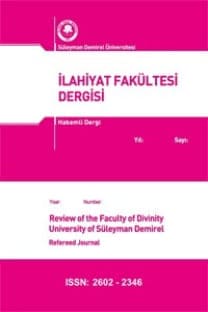YARGILARIN NASIL HAKLILANACAĞI DOĞRU BİR SORU OLARAK KALMAKTADIR
Bu makalede yargıların dayandığı temel unsurlar ve ilkeler üzerinden önerme ve argumanlarda tutarlılık, geçerlilik ve gerçeklik tartışmalarının haklılama için dayandığı unsurlar üzerinde durulmaktadır. Doğruluk değerlendirmelerinin dayandığı yargılar ele alınırken, kavramsal süreçlerin bu süreçteki eleştirel yeri tartışılmış, epistemik yargılamaların kabuller, inançlar, zanlar, tasdiklerin geçerlilik ve tutarlıkla olan ilişkileri üzerindeki problemler tartışılmıştır
Anahtar Kelimeler:
Yargılar, Kabuller, Doğruluk iddiaları, Haklılama, Epistemik Yargılama
HOW JUDGEMENTS ARE TO BE JUSTIFIED REMAINS A FAIR QUESTION
This paper deals with the importance of logical analysis for establishing our judgments of “justified beliefs” for deciding on truth values in reasoning. Primarily thought developing processes for justification has been analysed through establishing ground discussions for propositions and syllogism. I analyse structures of judgements which are established on analysis of Truthclaims. Conceptual processes are essential part of this critique of justification for truth-values. Also epistemic preferences grounds conviction, assurance, acceptance, assumption, decision, and belief for validity and coherency
Keywords:
Judgments, Belief, Truth-claims, Justifications, Epistemic Justification,
___
- ABED, Shukri B. (1991), Aristotelian Logic and the Arabic Language in Alfarabi, SUNY Press, Albany.
- ABERDEIN, Andrew (2007), “The Informal Logic and Mathematical Proof”, Perspectives on Mathematical Practices, B. Van Kerkhove, J.P. Van Bendegem (ed.), Springer, Netherlands.
- ADAMSON, Robert (1911), A Short History of Logic, William Blackwood& Sons, Edinburgh.
- ALEX, Robert (2010a). The Argument from Injustice: A Reply to Legal Positivism. Oxford University Press, Oxford.
- ALEX, Robert (2010b). A Theory of Legal Argumentation: The Theory of Rational Discourse as Theory of Legal Justification. Tr. R.Adler & N.
- MacCormick, Oxford University Press, Oxford.
- BARNES, Jonathan (2008), Truths, etc. OUP: Oxford.
- BERGER, Alan (2009), Terms and Truth, The MIT Press, Massacuset. BRONN, Carl (1998), “Applying Epistemic Logic and Evidential Theory to Strategic Arguments”, Strategic Management Journal, Vol. 19: 81– 95. BROWN, Curtis (1986), “What is a Belief State?”, Midwest Studies in Philosophy, 10: 357–378.
- CAIRNS, Huntington (1980), Legal Philosophy from Plato to Hegel. Greenwood Press, Connecticut.
- COPI, Irving M. (1967), Symbolic Logic, Macmillan, New York.
- COPI, Irving M. ve Keith Burgess-Jackson (1995), Informal Logic, (3. edition), Prentice Hall, New Jersey.
- DAOR, Dan (1978), “Modes of Argument”, Philosophy East/Philosophy West: A Critical Comparison of Indian, Chinese, Islamic and European Philosophy, B. Scharftein, I. Alon, S. Biderman, Basil Blackwell, Oxford.
- GASKIN, Richard (2008), The Unity of the Proposition. OUP: Oxford. GRAYLING, Anthony C. (1982), An Introduction to Philosophical Logic, The Harvester Press, Sussex.
- GUTAS, Dimitri (1998), Greek Tought, Arabic Culture, Routledge, London.
- GWYNNE, Rosalind Ward (2004), Logic, Rhetoric, and Legal Reasoning in Qur’an: God’s Argument, RoutledgeCurzon, London.
- GYEKYE, Kwame (1979), Arabic Logic: Ibn Tayyib’s Commentary on Porphyrs’s Eisagoge, SUNY Press, Albany.
- HINTIKKA, Jaakko (1987), “The Fallacy of Fallacies”, Argumentation, 1: 211–238.
- HINTIKKA, Jaakko (1989), “The Role of Logic in Argumentation”, The Monist, 72: 3–24.
- HINTIKKA, Jaakko (2001), “Is Logic the Key to All Good Reasoning?”, Argumentation, 15: 35–57.
- KIRWAN, Christopher (1978), Logic and Argument, Duckwort: London.
- LYONS, Jack (2009), Perception and Basic Beliefs: Zombies, Moduels, and the Problem of The External World. OUP: Oxford.
- MACCORMICK, Neil (1978). Legal Reasoning and Legal Theory. Clarendon Press, Oxford.
- STUMP, Eleonore (1989), Dialectic and Its Place in the Development of Medieval Logic, Cornell University Press, Ithaca.
- WALBRIDGE, John (2011), God and Logic in Islam: The Caliphate of Reason, Cambridge University Press, Cambridge.
- WANSING, Heinrich (2006), “Doxastic Decisions, Epistemic Justification, and the Logic of Agency”, Philosophical Studies, 128: 201-207.
- WESTON, Anthony (1992), A Rule Book for Arguments, Hackett Pub., Cambridge.
- Yayın Aralığı: Yılda 2 Sayı
- Başlangıç: 1994
- Yayıncı: Süleyman Demirel Üniversitesi
Sayıdaki Diğer Makaleler
GENÇLERDE NORMATİF, POPÜLER VE PARANORMAL İNANÇLAR ÜZERİNE BİR ARAŞTIRMA: SDÜ ÖRNEĞİ
İlhan TOPUZ, Klasik Paranormal İNANÇ
BAŞLANGICINDAN 17. YÜZYILA KADAR İSLAM MİNYATÜR SANATINDA BAZI CEHENNEM TASVİRLERİNİN İKONOGRAFİSİ
YARGILARIN NASIL HAKLILANACAĞI DOĞRU BİR SORU OLARAK KALMAKTADIR
OSMANLI RESİM SANATINDA DÂBBETÜ’L-ARZ
KLASİK MANTIK AÇISINDAN TANRI’NIN TANIMLANAMAZLIĞI SORUNU -GAZZÂLÎ-İBN RÜŞD BAĞLAMINDA
KÜTÜB-İ SİTTE HADİSLERİ ÖZELİNDE ŞEYTAN, MAHİYETİ VE YARATILIŞI
İSLÂM AİLE HUKUKU NORMLARININ TÜRK (AİLE) KÜLTÜRÜNE YANSIMASI
KUR’AN’A GÖRE AKIL-GAYB İLİŞKİSİ BAĞLAMINDA MANA YÖNÜNDEN MÜTEŞABİH AYETLERİN TEVİLİ MESELESİ
